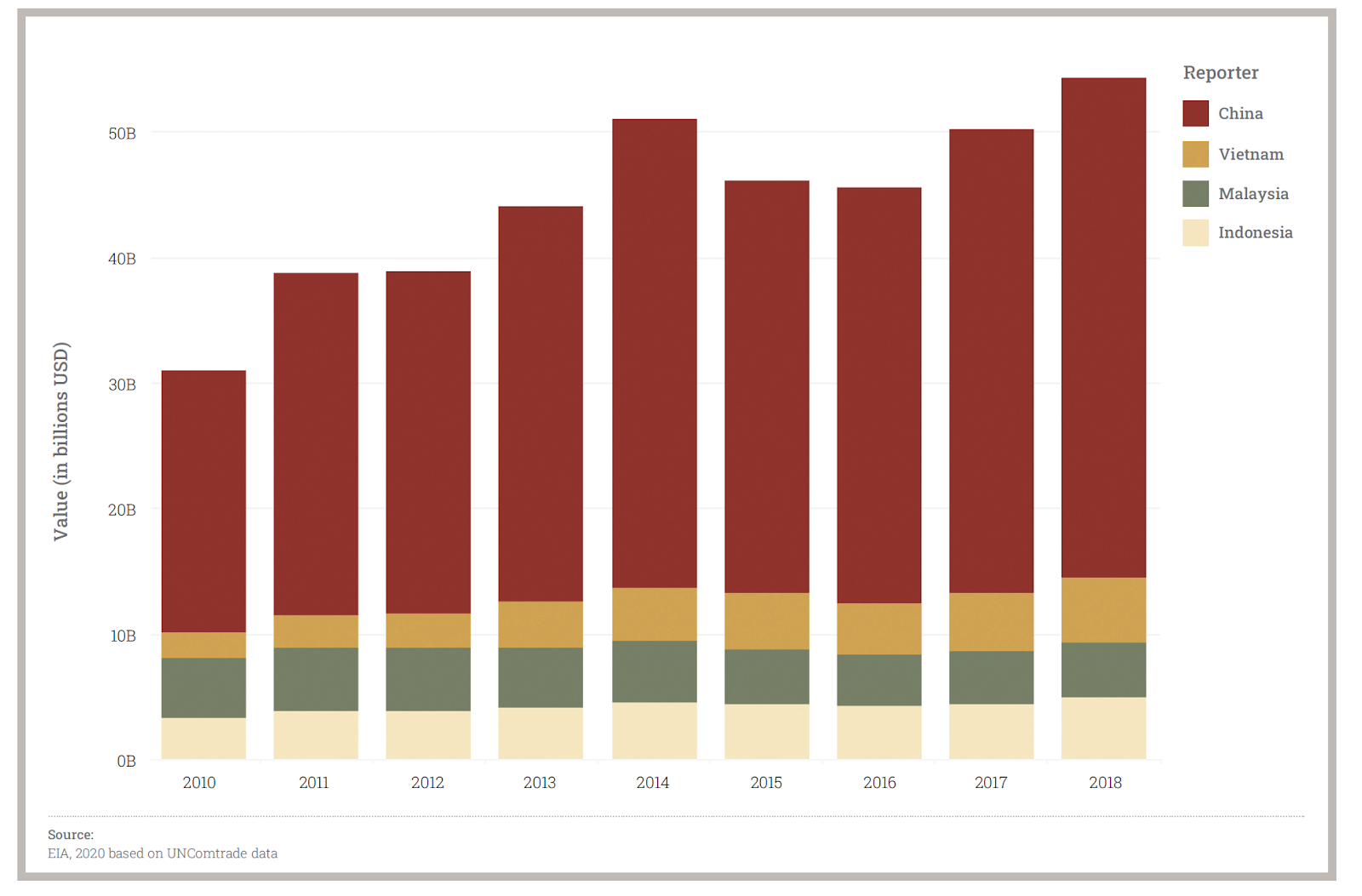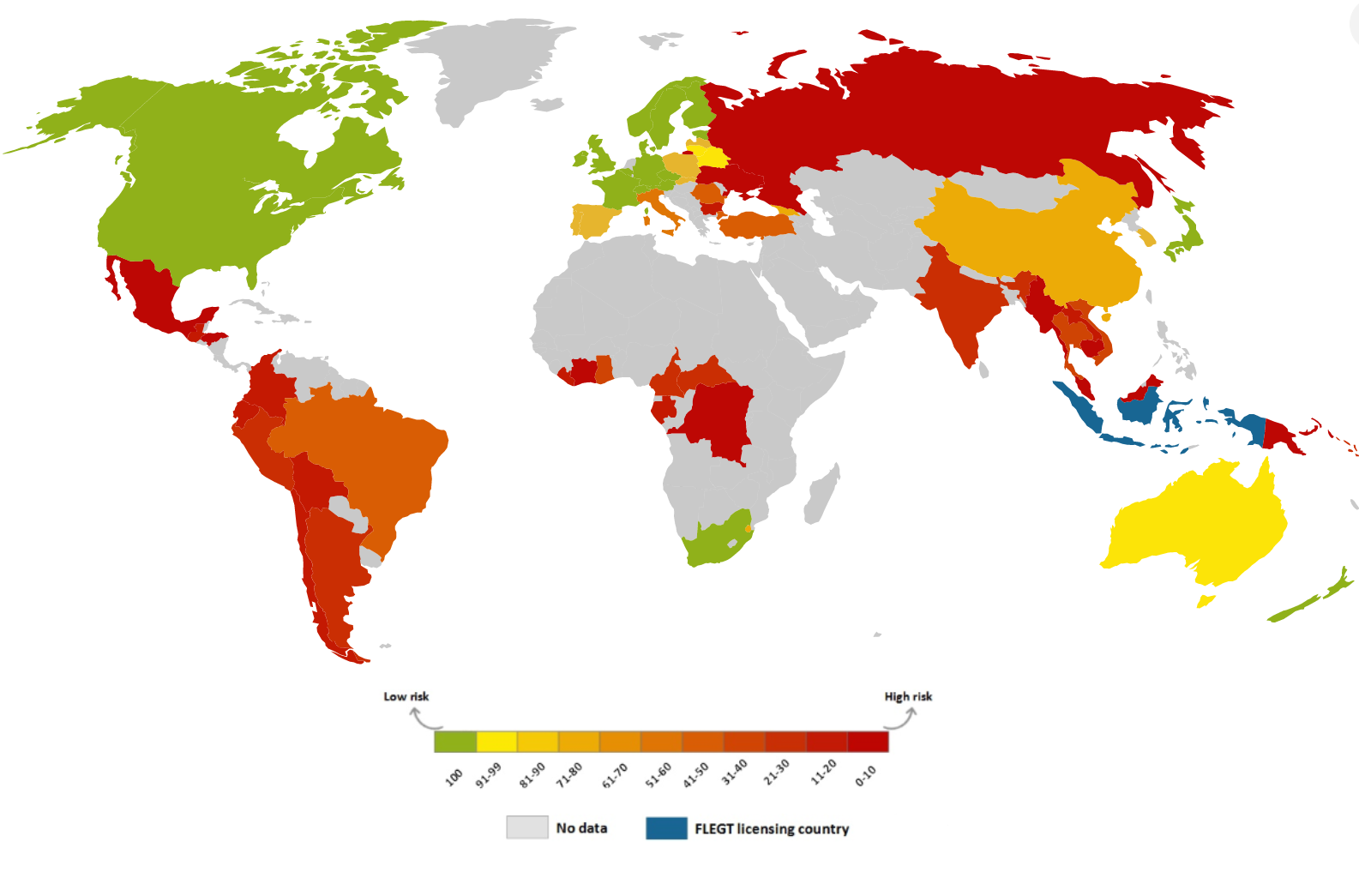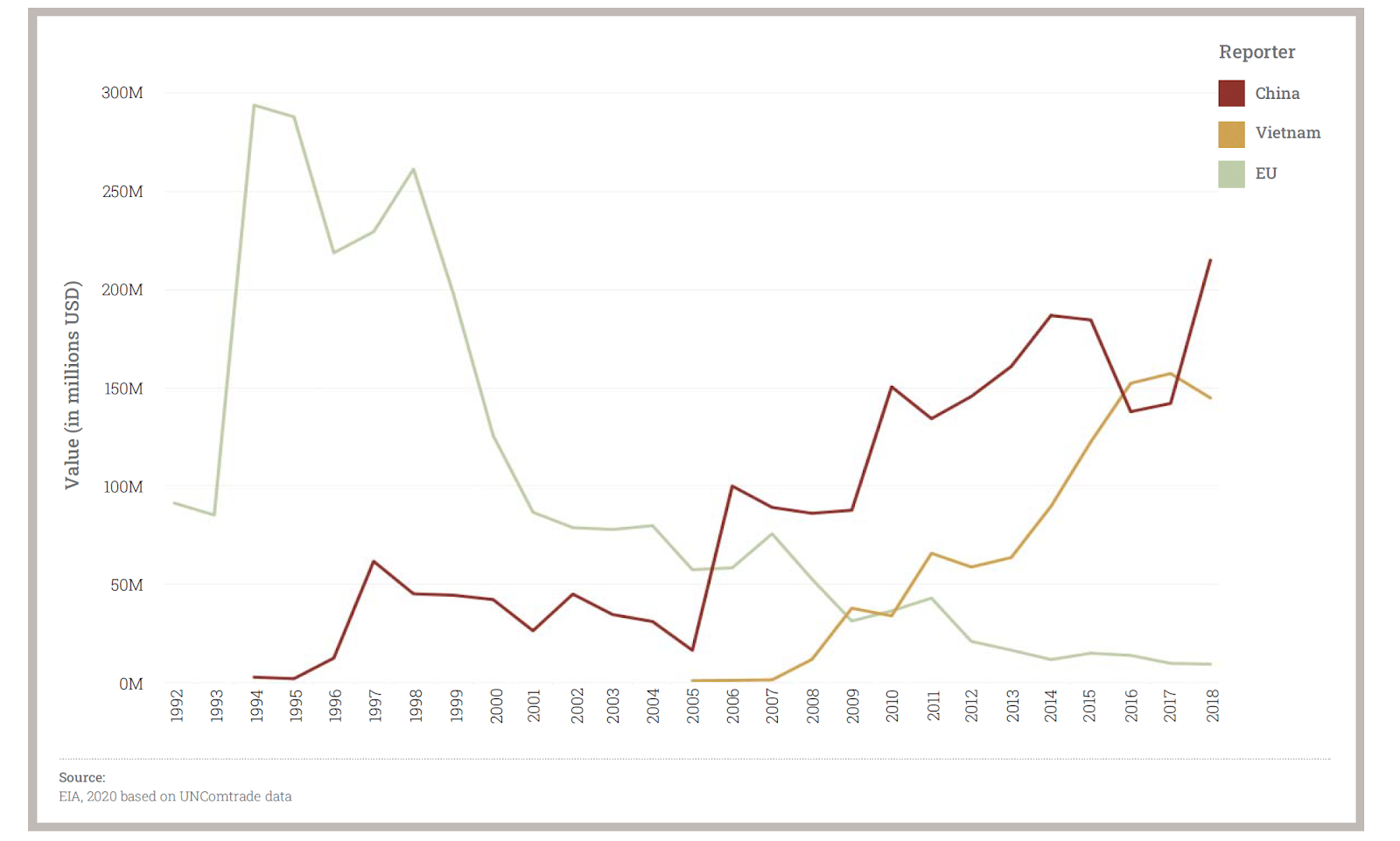Việt Nam Slashes Use of Death Penalty: Eight Crimes Removed, Including Corruption and Drug Offenses
Key Events * Việt Nam Abolishes Death Penalty for Corruption Amid Wave of High-Profile Trials * Chinese Survey Ship Operates Near Việt

“…it is like destroying forest in other people’s backyards, not in ours.” – A quote from an informant working for a Vietnamese timber logging company, according to EIA.
Various Vietnamese companies are damaging Cameroon’s forests and its economy through logging activities in the country, according to a new report by the Environmental Investigation Agency (EIA), an international non-profit organization aiming to protect the global climate.
In an investigative report, the EIA said that these companies extracting timber to export back to Vietnam were violating export laws and were engaging in labor exploitation and discrimination, tax evasion, illegal logging, and other things.
The Vietnamese socialist government has consistently condemned the imperialism and economic exploitation that has resulted from capitalism. In a recent article about socialism, Nguyen Phu Trong, the Secretary General of the Vietnamese Communist Party (VCP), declared that the country should strive for “sustainable development… instead of usurping natural resources and destroying the environment.” A socialist government is regarded as the alternative to capitalist countries which have failed to address the problems of environmental damage and labor exploitation.
However, this issue highlights that companies coming from a government of such ideology are perfectly capable of environmental, economic, and labor abuses – especially when it concerns less developed countries.
Timber is largely used as the architectural materials for Buddhist temples and private houses in Vietnam. Previously, the market was dominated by timber extracted and exported from Laos and Cambodia; but the companies have moved to Cameroon due to its relaxed laws surrounding logging.
Vietnam is now the second-largest timber processing hub in Asia, only after China.

The private companies named in the report include Dai Loi Trading Co. Ltd., Xuan Hanh Wood Company, Thang Long Import-Export Company Ltd., Hai Duong Wood Import-Export Company Ltd., and an unregistered Vietnamese company represented by someone known as Le Jessan Tan. All of these companies are reportedly private companies, meaning no links with the government have been found.
The EIA reportedly conducted this independent investigation for three years before releasing the report in late 2020. The report is titled “Tainted Timber, Tarnished Temples: How the Cameroon-Vietnam Timber Trade Hurts the Cameroonian People and Forests.”
In its ideological doctrine, the VCP consistently claims that the socialist government is “of the people, by the people, and for the people.” Land in Vietnam is also constitutionally “owned by the people,” and the private ownership of land is theoretically unconstitutional. The VCP’s socialism is understood as a way to uplift the common people by limiting the power of private businesses and corporations.
Despite Vietnam’s commitment to socialism, stories about environmental and labor exploitation are not new in the country’s private sector. With various sources of natural resources and a large population providing cheap laborers, the country is ripe for exploitation.
The case of Formosa in 2016 is an example. During this time, Hung Nghiep Formosa Ha Tinh, Ltd., a Vietnamese private company, was heavily polluting the seas in central Vietnam, leading to massive fish and other marine life deaths. The primary investor of Hung Nghiep Formosa Ha Tinh, Ltd. is the Taiwanese Formosa Plastics Group.
Human lives have also been a loss. As the results of such massive fish deaths, some people died or became seriously ill, with others even believed to have developed cancer, from either diving in the sea, eating poisonous fish, or as the result of exposure to the company’s chemicals.
For years, various cases of illegal timber trade in Vietnam have been reported. There have been 30,000-50,000 cases of forest violations per year, according to statistics provided by the international non-profit organization Preferred by Nature. The organization also regards Vietnam as one of the most high-risk countries regarding the illegal timber trade.
Even state-controlled media outlets in Vietnam sometimes publish opinion articles criticizing the Vietnamese government’s handling of environmental issues.

Workers in Vietnam also face tremendous hardships and, in many cases, outrageous exploitation.
For example, cases of forced labor in drug detention centers have been reported, in which people struggling with drug addiction were not only forced to provide free labor but were also tortured. In the garment industry, child labor is among the common practices. Even among the “normal” workers – those who are non-criminal adults and are able-bodied-mistreatment, underpayment and lack of social security were also frequently reported.
Because of this, it is not surprising that there are similar and even worse cases committed by Vietnamese companies abroad.
Vietnamese companies are accused of various unethical activities in Cameroon, including violation of export laws, tax evasion, illegal harvesting, disregarding the illegal origin of timber, and abuse of workers.
In the name of profit, the companies casually commit these illegal activities. According to the report, to maximize profits, the companies hired workers for years without a proper contract or social security guarantees. They frequently discriminated against, underpaid, and abused Cameroon workers.
The companies also avoided paying taxes in Cameroon by mostly conducting transactions with cash. From 2014 to 2017, around $300 million went unreported when timber was being exported to Vietnam, according to the EIA investigation.
Alongside these violations, the companies also turn a blind eye to illegal timber, even if such timber originated from terrorist organizations. In fact, according to EIA, the company Dai Loi was reportedly buying timber that originated from Hezbollah.
One informant from one of the Vietnamese private companies compared the way Vietnamese and French companies inspect timber in Cameroon. According to the informant in the report, the French asked many questions regarding the origin of the timber, such as whether child labor was involved. But the Vietnamese only care about whether there is documentation to bypass the Vietnamese customs, even if the timber was harvested illegally. The informant said:
“We wouldn’t care less about your wrongdoings. Just give me whatever papers that the customs require…”
Vietnamese customs also do not care about illegal logging because “it is like destroying forest in other people’s backyards, not in ours.”

The EIA report recommends the Vietnamese government do the bare minimum: official acknowledgments of the loopholes in importing timber, followed by more effective regulations regarding fraudulent paperwork and financial transactions of private timber companies.
So far, half a year after the report’s release, no state-controlled media in Vietnam has reported on the situation. There have been no official statements and no apologies.
Based on his article on socialism, Nguyen Phu Trong would argue that these flaws exist because the country is in the “transition period” to socialism. This means that existing exploitation is not the government’s ideology but rather the inevitable reality of the global capitalist, market-oriented economy. Furthermore, these companies are private and not government-affiliated, so it is not the system’s fault.
Let us assume that this argument is true. If so, however, it is even more important and urgent for Vietnamese leaders and policymakers to acknowledge the unethical activities of these companies and come up with more effective regulations to demonstrate their commitment to socialism – which, according to their own arguments, is supposed to be healthier for the environment, the economy and workers.
Or are we supposed to wait endlessly for an unambiguous date of a successful transition to socialism?
Vietnam's independent news and analyses, right in your inbox.